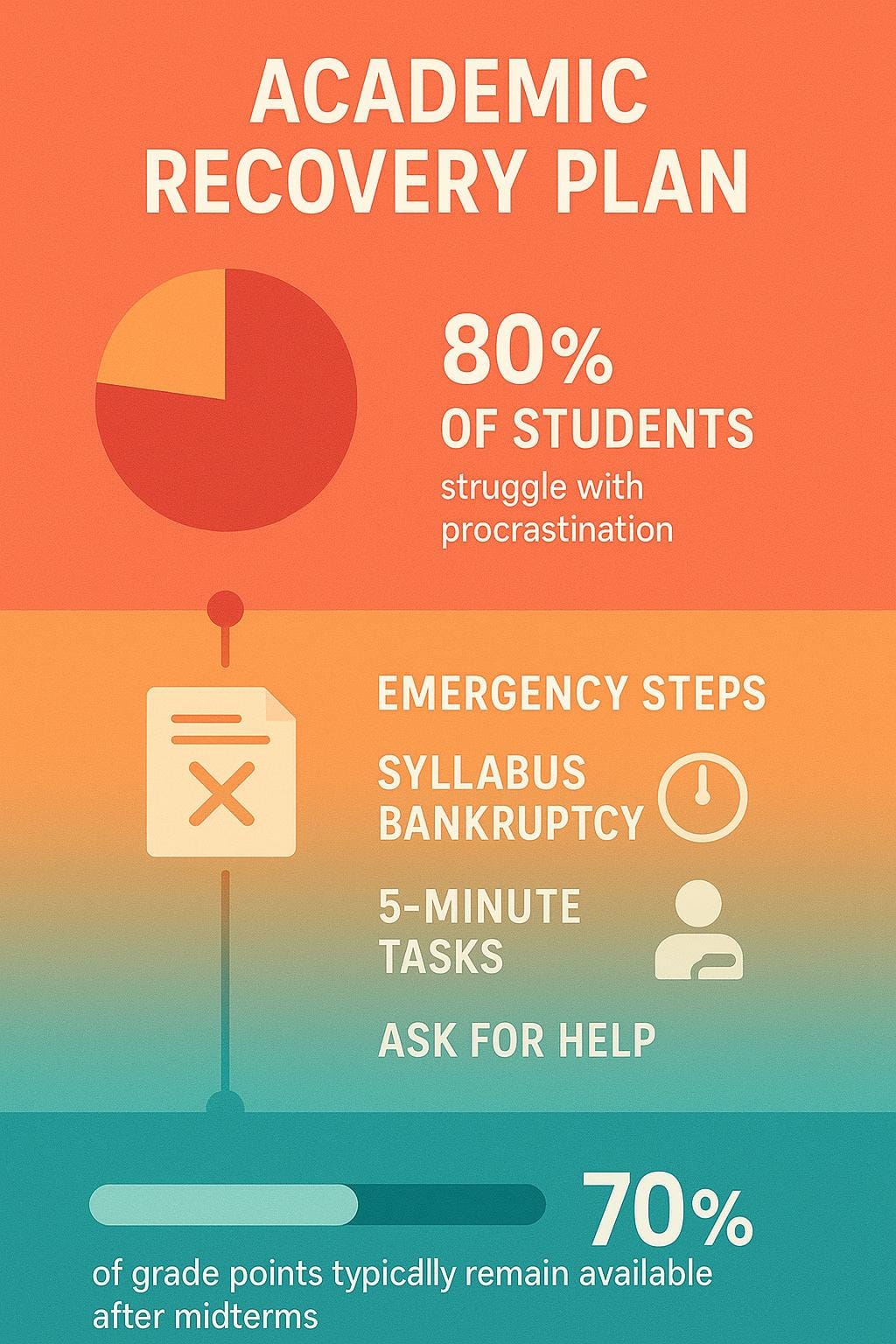The glossy optimism of syllabus week has faded into the harsh reality of assignment deadlines, unread textbooks, and that sinking feeling in your stomach when you check Canvas. We’ve all been there – that moment when you realize the fresh start you promised yourself has evaporated and you’re staring down what feels like an insurmountable pile of academic obligations with no clear path forward.
Key Takeaways
- You’re not alone – 80% of college students struggle with procrastination and falling behind is a near-universal experience
- The perfectly organized student is largely a myth – only 7% consistently maintain perfect systems throughout a semester
- Use “syllabus bankruptcy” to strategically prioritize the 20% of work that yields 80% of your grade
- Break paralysis by committing to ridiculously small tasks (5 minutes) to build momentum
- Professors actually want you to ask the “dumb” questions – 89% wish more students would seek clarification
The Universal Experience of Falling Behind
If you’re feeling like everyone else has their academic life together while you’re drowning in a sea of unread PDFs and looming deadlines, I’ve got news for you. You’re actually part of the overwhelming majority. Research shows that 80-95% of college students procrastinate, with about half doing so consistently enough to cause significant academic problems.
I remember sitting in my dorm room during my sophomore year, staring at my laptop with 17 unread Canvas notifications, two papers I hadn’t started, and lecture notes I hadn’t reviewed since week one. The panic was real. The shame was real. And the paralysis was absolutely real.
What no one tells you when you’re filling your cart with color-coded notebooks and fancy planners in August is that almost everyone hits this wall by mid-September. That initial burst of organizational energy and academic commitment rarely survives contact with the reality of college life, social activities, work obligations, and the general chaos of being a young adult.
The good news? This experience is so common that there are actually proven strategies for digging yourself out. But first, we need to address the biggest lie in academia.
The Myth of the Perfectly Organized Student
We all know that person (or think we do) – the one with the immaculate planner, color-coded notes, and seemingly supernatural ability to stay on top of everything. They’re the student who raises their hand to ask about assignments due three weeks from now while you’re still trying to figure out what happened in last Thursday’s lecture. They’re a unicorn.
In reality, studies show that only about 7% of students consistently maintain perfect organization systems throughout an entire semester. The rest of us? We’re just doing our best with varying degrees of success and failure.
What’s particularly insidious is how perfectionism actually feeds procrastination. Research reveals that 70% of chronic procrastinators have perfectionist tendencies – they put things off because they’re afraid they can’t do them perfectly. If this sounds familiar, you’re caught in a common trap: not starting because you can’t execute flawlessly.
Many of your professors – yes, those seemingly put-together academics – were chaos-navigators themselves in college. I once had a brilliant literature professor admit she wrote her undergraduate thesis in a 36-hour caffeine-fueled marathon after weeks of avoidance. Success doesn’t require perfection; it requires resilience.
So now that we’ve debunked the myth that you’re somehow uniquely disorganized, let’s talk about what actually works when you’re already behind. It’s time for academic triage.
Emergency Triage Step 1: Declare ‘Syllabus Bankruptcy’
When you’re drowning in academic obligations, trying to catch up on everything is often the worst strategy. Instead, I want you to consider a concept I call “syllabus bankruptcy” – the strategic decision to let certain things go so you can salvage what matters most.
This isn’t about giving up; it’s about the 80/20 rule in academics. Identify the 20% of work that will yield 80% of your grade and focus your limited energy there. Start by scanning each syllabus for high-value assignments – those worth 15% or more of your final grade deserve priority attention.
Here’s how to implement syllabus bankruptcy effectively:
- Mark every assignment with its percentage of your final grade
- Identify “mandatory” versus “optional” readings (hint: if it’s not explicitly tested or required for a paper, it might be optional)
- Look for opportunities to combine efforts (can one research session serve multiple classes?)
- Be realistic about what small assignments you might need to sacrifice to complete larger ones
One of my former classmates, Alex, realized in October that he was hopelessly behind in readings for his political science seminar. Instead of attempting to read everything, he strategically focused on understanding the core theoretical frameworks and key case studies that would be central to the final paper. He let go of the secondary readings, participated meaningfully in discussions about the main concepts, and ended with an A-.
The key here is making these decisions consciously rather than through avoidance. You’re not ignoring work; you’re strategically allocating your limited resources for maximum academic return. This shift in mindset is critical for breaking the paralysis that comes with overwhelm.
Emergency Triage Step 2: Break the Paralysis with Ridiculously Small Wins
When you’re staring down multiple deadlines and a mountain of backlogged work, your brain often shuts down entirely. This isn’t laziness – it’s decision paralysis, and it affects 68% of students facing multiple competing academic priorities.
The solution isn’t willpower or elaborate productivity systems. It’s making your next action so ridiculously small that your brain can’t come up with a reason not to do it.
Research shows that committing to just 5 minutes on a dreaded task reduces avoidance by 60%. The key is that once you start, continuing becomes much easier than you anticipated. Momentum creates motivation, not the other way around.
Here are some “ridiculously small” starting points for common assignments:
- For a paper: Write just the title and your name. Then write one sentence (just one!) of the introduction.
- For a reading: Read only the abstract and conclusion, then write a single-sentence summary.
- For a problem set: Set up the first problem, even if you don’t solve it.
- For a presentation: Create just the title slide with your name on it.
These aren’t just random small tasks – they’re what I call “momentum triggers” because they disproportionately reduce the psychological barrier to continuing. The hardest part of any academic task is almost always starting.
I used this approach for a 20-page research paper that had me completely paralyzed. I committed to writing one terrible paragraph – purposely bad, just to get something on the page. Three hours later, I had six pages done. The momentum carried me once I got past that initial barrier.
Emergency Triage Step 3: Ask the ‘Dumb’ Question
When you’re behind, reaching out for help feels like confessing a crime. But here’s a statistic that might change your perspective: 89% of professors report wishing more students would ask for clarification when they’re struggling. Your silence isn’t protecting your image – it’s preventing your recovery.
The question you think is “dumb” is usually the exact one several other students want to ask. By breaking the silence, you’re not exposing yourself as uniquely unprepared – you’re actually demonstrating initiative that professors respect.
Here’s a template email that has worked for countless students (including me):
“Hi Professor [Name],
I’ve fallen behind in understanding [specific concept/assignment] and want to get back on track. I’ve reviewed [mention something specific you’ve tried], but I’m still struggling with [specific issue]. Would it be possible to discuss this during your office hours on [date], or could you point me toward additional resources that might help?
Thank you,[Your Name]”
What makes this approach effective is that it shows you’re taking responsibility while also being specific about what you need. Professors respond much more positively to students who acknowledge their situation and propose steps forward.
Office hours are also dramatically underutilized resources. Studies show less than 10% of students regularly attend, yet those who do consistently perform better. When you go, bring specific questions or problematic assignments, not vague concerns. This makes the conversation productive for both you and your professor.
Redefining Success: Resilience Over Perfection
Here’s something that took me years to learn: maybe success isn’t about executing a perfect plan from day one. Maybe it’s about developing the ability to recover when things inevitably go sideways. Academic resilience predicts workplace success better than perfect execution ever could.
The perspective that helps most when you’re feeling hopelessly behind is timeline awareness. Did you know that typically 70% of semester grade points remain available after midterms? Your academic story is far from written at the midpoint, even if it feels like the narrative is already set.
I spoke with several seniors and recent graduates about what they wish they’d known about recovering from early semester struggles. Their insights were remarkably consistent:
- The students who succeeded weren’t the ones who never fell behind – they were the ones who developed effective recovery strategies
- Most regretted the time they spent feeling guilty more than the time they spent catching up
- Almost all wished they’d reached out for help earlier rather than trying to solve everything alone
- Many found that their “behind” periods taught them more about themselves than their “on top of everything” periods
The reality is that learning to recover from academic setbacks might be one of the most valuable skills you develop in college. The workplace doesn’t reward people who never make mistakes – it rewards those who can effectively address and learn from them.
Moving Forward With Imperfect Action
The fresh start is indeed over, and yes, you’re probably behind. But the semester isn’t over, your potential hasn’t disappeared, and you have more agency than your anxious brain is telling you. The path forward isn’t perfect execution – it’s strategic, imperfect action.
Start by declaring syllabus bankruptcy today. Identify your high-value assignments and create ridiculously small first steps for each one. Then, draft that email to your professor or mark their office hours on your calendar.
The feeling of being overwhelmed doesn’t disappear overnight, but it does begin to dissolve with each small action you take. And remember – you’re not failing at college life. You’re just learning how to navigate it, like the rest of us.
Perhaps the most important thing I can tell you is that this moment of falling behind isn’t an indictment of your abilities or your future. It’s just part of the messy, non-linear process of becoming an educated person. The story of this semester hasn’t been written yet – and you still hold the pen.
Sources
Taylor & Francis Online – College Student Procrastination and Academic Performance
SAGE Journals – The Role of Perfectionism in Procrastination Behaviors
PsycNet – Academic Resilience: Development of a New Construct
ScienceDirect – Small Wins and Momentum in Academic Task Completion
Inside Higher Ed – Why Students Don’t Go to Office Hours and How to Encourage Them












